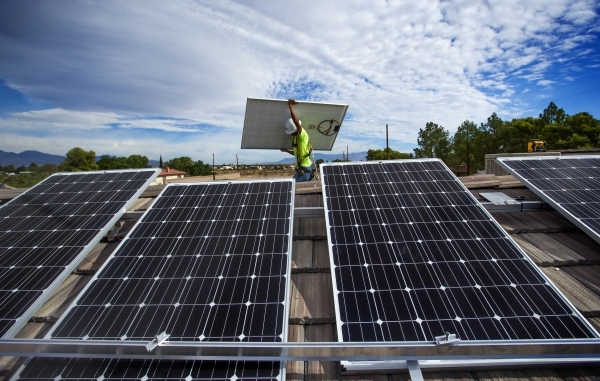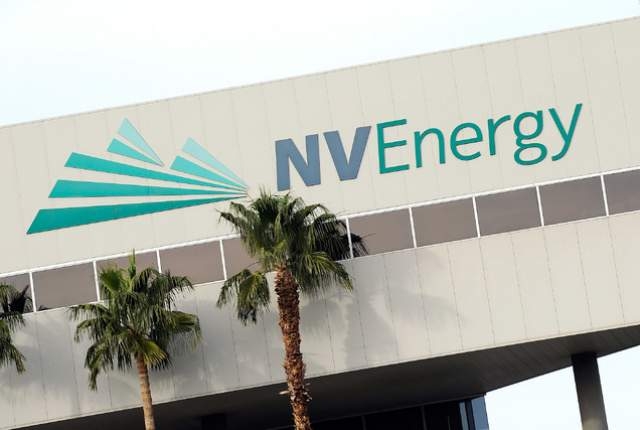PUC official opposes rooftop-solar change sought by NV Energy


CARSON CITY — Continuing the long-running battle over the future of rooftop solar, a member of the Nevada Public Utilities Commission on Monday recommended against a demand charge sought by NV Energy and vehemently opposed by the rooftop solar industry.
Instead, Commissioner David Noble in a draft order proposed a two-part tariff consisting of a service charge and a commodity charge based on volume. Noble also proposed that the new tariff that would take effect Jan. 1 apply retroactively to all net metering customers, a change that concerns both the rooftop solar industry and customers who entered into contracts based on the original net metering tariff.
The draft order will be considered by the three-member commission at its meeting today.
Despite the rejection of the demand charge, solar officials blasted the draft order, saying it will lead to a much higher monthly fixed charge and a substantially lower per kilowatt hour credit for excess electricity for rooftop solar customers that will make installations uneconomical.
Bryan Miller, senior vice president, public policy and power markets for Sunrun, called it “incredibly unclear.”
“What is clear is that no one can understand this, yet the Public Utilities Commission is about to vote on it tomorrow,” he said. “This decision should be delayed.”
Another solar firm, SolarCity, said the proposed rate structure will mean the end of the solar industry in Nevada.
Lyndon Rive, CEO of SolarCity, said in a statement: “If the Nevada Public Utilities Commission’s proposed decision is accepted tomorrow it will destroy the rooftop-solar industry in one of the states with the most sunshine. There is so much wrong with the decision, the only option for the PUC is to reject it. The one beneficiary of this decision would be NV Energy, whose monopoly will have been protected. The people will have lost choice, jobs, and faith in their government.
“The decision would retroactively sabotage the investments Nevadans have already made in solar, even though they were encouraged by their government to make those investments,” he said. “If the PUC approves this proposal, it will force SolarCity to cease sales and installation operations in Nevada.”
NV Energy had no comment on the draft order, which the PUC said “outlines a transition of all small commercial and residential net metering customers to a cost-based rate structure over the next four years that will eliminate unreasonable cost shifts between ratepayers without resulting in any additional profits to NV Energy.”
Bobby Hollis, a Las Vegas rooftop solar customer, said the retroactive change in the rules will mean new costs to those who installed systems under the old rules.
“While many states are making changes, it is unheard of to change the law retroactively to customers who paid a premium to do what they thought was good for the state,” he said in an email. “This is huge and horribly offensive to the entire rule of law.”
The draft order could adopt the following changes:
— Separate ratepayer classes for all small commercial and residential net metering customers to ensure no cost shift to other ratepayers.
— Excess energy produced through net metering systems will be compensated at the wholesale market rate.
— An increase to the fixed charge and corresponding decrease to the volumetric commodity charge to reduce inequities among net metering customers.
— An optional time-of-use pricing option to allow net metering customers to take advantage of energy generation that occurs during peak and off-peak demand periods.
— Incremental implementation of new rates over four years.
If the draft order is adopted by the three-member commission, NV Energy then will calculate the exact amounts of the rates based on the PUC’s instructions. The new rates will be filed with the PUC for final review within seven days of the effective date of the order.
The battle over the future of rooftop solar in Nevada has been contentious as state regulators were asked by state lawmakers to decide on a new rate for net metering customers. Net metering allows homeowners with rooftop solar systems to receive a credit for the excess energy they generate.
The issue has pitted the rooftop solar industry and its allies against NV Energy over a new net metering tariff proposed by the utility, doing business as Nevada Power in Southern Nevada.
Rooftop-solar industry officials argued that the proposed policy from the utility would kill the industry and its 6,000 Nevada jobs. NV Energy argues the current policy requires nonsolar ratepayers to subsidize rooftop solar customers and needs to reflect the intent of the 2015 Legislature.
— Contact Sean Whaley at swhaley@reviewjournal.com or 775-687-3900. Follow him: @seanw801












